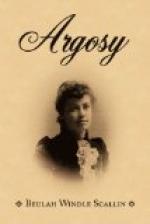“The time soon passed on and the week before Easter again arrived, and on the Wednesday evening, about 11.45, we entered the cathedral by the transept door. The moon shone brightly and we easily found our way into the nave; and sitting down, awaited the development of events. The shadows cast by the moonlight were very weird and ghostly in their effect; and had we been at all impressionable, we should doubtless have wished ourselves back again. After remaining some time, however, we came to the conclusion that we had come upon a foolish errand, and had just risen to go, when an exquisite strain of very soft music came from the organ. We listened spell-bound, rooted to the spot. The theme was simple, almost Gregorian in its character, but handled in a most masterly way. Such playing I had never before heard; it was the very perfection of style.
“We were listening evidently to what was an opening prelude, for several different subjects were introduced and only partially worked out.
“Several times I fancied a resemblance to the old Credo, and once distinctly caught a well-known phrase; my doubts were soon solved, however, for in a few moments we heard it in its entirety.
“You know how difficult it is to put one’s impressions of music into words; language never fully expresses them. Music can be easily described in dry technical language, the language which deals in ‘discords and their resolutions,’ but that does not express its influence upon ourselves. No language can do that, for it is an attempt to fathom the infinite.
“As the varied harmonies echoed through the vaulted nave, flooding it with a perfect sea of melody, it appeared as if we were listening to the story of a man’s life.
“There were the uncertain strains of youth, the shadowing forth of vague possibilities, the expression of hope undimmed by disappointment. A nameless undefined longing for greater liberty. The desire to be free from the restraints of home, and to mingle with the busy world in all the pride of early manhood. Soon the voyager puts off from the shore, and at first all seems smooth and alluring. He drifts along the ocean of life, wafted by favourable winds, delighting in each new pleasure. But storm soon succeeds calm, as night follows day, and the young man is soon encompassed with the sorrows and temptations of this life, battling against evil habits, struggling to keep himself unspotted from the world.
’Bella premunt hostilia
Da robur, fer auxilium.’
“Youth passes on to middle age, there is now an earnestness of purpose which at first was lacking. Material pleasures are losing their hold, there are traces of another holy influence: two lives are joined in happy union, leading and encouraging each other to high and noble thoughts and actions. A sound of thankfulness and praise is heard, to be followed only too soon by the strain which tells of mourning and heaviness: one was taken, the other left to toil on alone. But still there was a purpose in life, a work to be done, something to live for. And with lamentation is blended hope.




